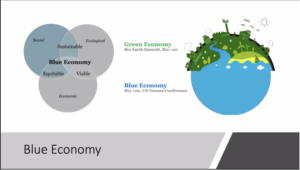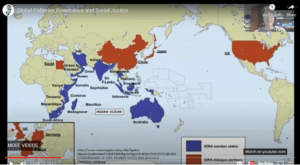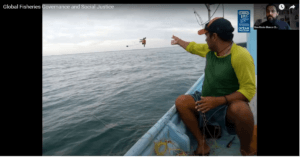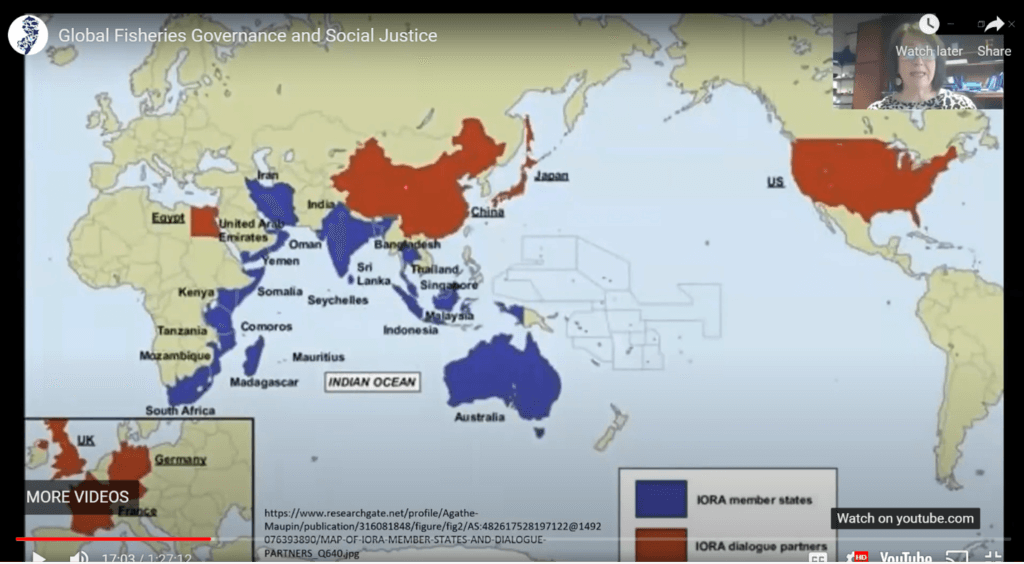By Madison Hanrahan
 On Friday, April 8, the Urban Coast Institute (UCI) and the Institute of Global Understanding (IGU) co-hosted a Global Ocean Governance panel focused on the topic of global fisheries governance and social justice. This panel included three speakers: Dr. Erika Techera, a professor of environmental law at the University of Western Australia; Dr. Xiao Recio-Blanco, the director of the Ocean Program at the Environmental Law Institute; and Dr. Yoshitaka Ota, a research assistant professor at the School of Marine & Environmental Affairs at the University of Washington. The panelists discussed issues such as social justice and accountability, the promotion of small-scale fisheries and sustainable fisheries, and the blue economy.
On Friday, April 8, the Urban Coast Institute (UCI) and the Institute of Global Understanding (IGU) co-hosted a Global Ocean Governance panel focused on the topic of global fisheries governance and social justice. This panel included three speakers: Dr. Erika Techera, a professor of environmental law at the University of Western Australia; Dr. Xiao Recio-Blanco, the director of the Ocean Program at the Environmental Law Institute; and Dr. Yoshitaka Ota, a research assistant professor at the School of Marine & Environmental Affairs at the University of Washington. The panelists discussed issues such as social justice and accountability, the promotion of small-scale fisheries and sustainable fisheries, and the blue economy.
 Dr. Techera’s prerecorded presentation addressed illegal fishing and governance in the Indian Ocean. She emphasized the Indian Ocean’s importance, as it connects multiple regions and countries with vastly different cultures, development, and laws that comprise a diverse and unique realm of fishing governance. Because this region is the fastest growing economy in the world, it is critical that policymakers and researchers examine and improve ocean and fishing regulations. All the countries in this region are highly dependent on the ocean. Dr. Techera noted that ensuring sustainable fishing practices in the Indian Ocean is necessary for the environment and for the region’s future development. In light of the fact that the technology to create sustainable fisheries already exists, there should be no hesitation in adopting the technologies. Dr. Techera explained that two areas of concern for countries surrounding the Indian Ocean and for the Indian Ocean Rim Association (IORA) member states are that the region researchers and states need to improve their understanding and recognition of the region to help these countries achieve their blue economy goals and confirm that sustainable fishing is crucial for this region. The countries bordering the Indian Ocean rely on the ocean for food, for security, and for their peoples’ livelihoods.
Dr. Techera’s prerecorded presentation addressed illegal fishing and governance in the Indian Ocean. She emphasized the Indian Ocean’s importance, as it connects multiple regions and countries with vastly different cultures, development, and laws that comprise a diverse and unique realm of fishing governance. Because this region is the fastest growing economy in the world, it is critical that policymakers and researchers examine and improve ocean and fishing regulations. All the countries in this region are highly dependent on the ocean. Dr. Techera noted that ensuring sustainable fishing practices in the Indian Ocean is necessary for the environment and for the region’s future development. In light of the fact that the technology to create sustainable fisheries already exists, there should be no hesitation in adopting the technologies. Dr. Techera explained that two areas of concern for countries surrounding the Indian Ocean and for the Indian Ocean Rim Association (IORA) member states are that the region researchers and states need to improve their understanding and recognition of the region to help these countries achieve their blue economy goals and confirm that sustainable fishing is crucial for this region. The countries bordering the Indian Ocean rely on the ocean for food, for security, and for their peoples’ livelihoods.
Next, Dr. Xiao Recio-Blanco delivered a lecture on galvanizing community participation with regulatory reform for small-scale fisheries governance. He emphasized that 90 percent of the world’s 120 million fisheries are small-scale fisheries, and each is extremely diverse in terms of technology and cultural use. He discussed the importance of regulating small-scale fisheries, as current laws are not tailored to a specific county or region’s needs, and small-scale fisheries are typically underfunded and politically weak compared to their industrial counterparts. It has been a challenging  process to create effective laws regarding small-scale fisheries due to a general lack of understanding of small-scale fisheries, inadequate organization, a focus on industrial fisheries for additional profit, and policymakers overlooking small-scale fisheries in their agendas. Dr. Recio-Blanco suggested solutions to unregulated small-scale fisheries, among them adopting additional guidelines for small-scale fisheries to follow, using legal language in laws that affect small-scale fisheries, ensuring the writer of these laws understands how small-scale fisheries operate, and encasing the discussion of small-scale fisheries using a human rights lens. With his suggestions, countries can ensure effective and sustainable small-scale fishing for decades to come.
process to create effective laws regarding small-scale fisheries due to a general lack of understanding of small-scale fisheries, inadequate organization, a focus on industrial fisheries for additional profit, and policymakers overlooking small-scale fisheries in their agendas. Dr. Recio-Blanco suggested solutions to unregulated small-scale fisheries, among them adopting additional guidelines for small-scale fisheries to follow, using legal language in laws that affect small-scale fisheries, ensuring the writer of these laws understands how small-scale fisheries operate, and encasing the discussion of small-scale fisheries using a human rights lens. With his suggestions, countries can ensure effective and sustainable small-scale fishing for decades to come.
Lastly, Dr. Yoshitaka Ota began his presentation by discussing the current ocean crisis, which is the result of climate change, development, pollution, and overfishing. He explained that, under current conditions, we will soon run out of fish to harvest from the ocean altogether. Scientific evidence shows that current fish stocks are at a biologically unsustainable level, and the biomass of predatory fish in the world’s oceans has declined by two-thirds over the last 300 years, indicating that there is not enough fish to sustain its population or human communities. Without human efforts to address climate change, the warmer ocean waters will drive fish closer to the poles, underscoring the need for sustainable fishing practices. Additionally, the current fishing practices violate human rights. Greedy fishermen practice wage slavery to catch more fish, hiring large numbers of workers and compensating them at low wages. Also, heedless businessmen approve chemical dumping, and runoff into the water contaminates fish that can then make the consumer ill.
By viewing sustainable fishing regulations through a human rights lens, countries would also be able to achieve or to contribute to other sustainability goals such as eliminating poverty and ending world hunger. Dr. Ota explained that the loss of fishing jobs to ensure sustainable fish supplies means that countries must guarantee new jobs for these fishermen. To summarize the current plight of small-scale fisheries, a conservation scientist quipped, “Fishermen need the ocean, but the ocean does not need fishermen.”
To view the recording of the panel, please visit the UCI’s webpage on the event.

